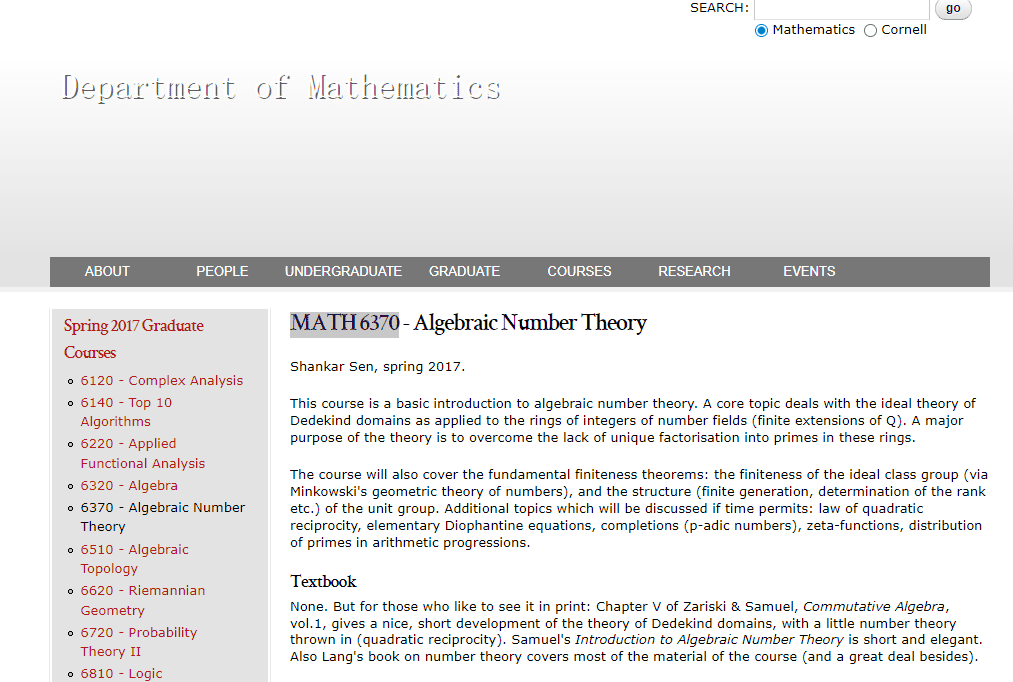数学代写|MATH6370 Algebraic number theory
Statistics-lab™可以为您提供cornell.eduMATH6370 Algebraic number theory代数数论的代写代考和辅导服务!

MATH6370 Algebraic number theory课程简介
This course is a basic introduction to algebraic number theory. A core topic deals with the ideal theory of Dedekind domains as applied to the rings of integers of number fields (finite extensions of $Q$ ). $A$ major purpose of the theory is to overcome the lack of unique factorisation into primes in these rings.
The course will also cover the fundamental finiteness theorems: the finiteness of the ideal class group (via Minkowski’s geometric theory of numbers), and the structure (finite generation, determination of the rank etc.) of the unit group. Additional topics which will be discussed if time permits: law of quadratic reciprocity, elementary Diophantine equations, completions (p-adic numbers), zeta-functions, distribution of primes in arithmetic progressions.
PREREQUISITES
The lack of unique factorization into primes in rings of integers of number fields is indeed a significant obstacle, and the development of the ideal theory of Dedekind domains provides a powerful tool for overcoming it. The fact that the ideal class group is finite is a crucial result in this context, and Minkowski’s geometric theory of numbers provides a beautiful geometric interpretation of this fact.
The structure of the unit group is another important topic, and it is closely related to the ideal class group. The determination of the rank of the unit group is a difficult problem in general, but there are many interesting results in special cases.
The law of quadratic reciprocity is one of the most famous results in number theory, and its proof involves many of the techniques and ideas from algebraic number theory. The distribution of primes in arithmetic progressions is another fascinating topic, and it has important applications in cryptography and other areas.
MATH6370 Algebraic number theory HELP(EXAM HELP, ONLINE TUTOR)
(1) Prove that $\sin \left(1^{\circ}\right)$ is algebraic. (One approach is to begin by showing that the coefficient of $x^j$ in $g_m(x)$, as given in the lemma, is 0 if $j \not \equiv m(\bmod 2)$. There are easier approaches, but I won’t give hints for them.)
To prove that $\sin \left(1^{\circ}\right)$ is algebraic, we will use the following lemma:
Lemma: Let $m$ be a positive integer, and let $g_m(x)=\sum_{k=0}^{\lfloor m/2 \rfloor} (-1)^k \frac{x^{m-2k}}{(m-2k)!}$. Then, the coefficient of $x^j$ in $g_m(x)$ is 0 if $j \not \equiv m(\bmod 2)$.
Proof of lemma: We can write $g_m(x)$ as $\sum_{k=0}^{\infty} (-1)^k \frac{x^{m-2k}}{(m-2k)!} – \sum_{k=\lfloor (m-1)/2 \rfloor + 1}^{\infty} (-1)^k \frac{x^{m-2k}}{(m-2k)!}$. The first sum is the power series for $\cos x$, and the second sum is the power series for $\sin x$ multiplied by $x$. Therefore, the coefficient of $x^j$ in $g_m(x)$ is given by $\frac{1}{j!} \left(\frac{d^j}{dx^j} g_m(x)\right){x=0} = \frac{1}{j!} \left(\frac{d^j}{dx^j} \cos x – x\frac{d^j}{dx^j} \sin x\right){x=0}$. This expression is 0 if $j \not \equiv m(\bmod 2)$, since both $\cos x$ and $\sin x$ are periodic with period $2\pi$.
Now, let’s return to the main problem of proving that $\sin \left(1^{\circ}\right)$ is algebraic. We can write $\sin \left(1^{\circ}\right) = \sin \left(\frac{\pi}{180}\right)$. Using the Taylor series expansion for $\sin x$, we have:
$$\sin x = \sum_{k=0}^{\infty} (-1)^k \frac{x^{2k+1}}{(2k+1)!}$$
Substituting $x=\frac{\pi}{180}$, we get:
$$\sin \left(\frac{\pi}{180}\right) = \sum_{k=0}^{\infty} (-1)^k \frac{\left(\frac{\pi}{180}\right)^{2k+1}}{(2k+1)!}$$
Let $m=2k+1$. Then, the coefficient of $\left(\frac{\pi}{180}\right)^m$ in the above expression is $(-1)^k \frac{1}{m!}$. By the lemma, this coefficient is 0 if $m \not \equiv 1(\bmod 2)$, i.e., if $k$ is even. Therefore, the only non-zero coefficients are for odd values of $m$, which correspond to even values of $k$. In particular, the coefficient of $\left(\frac{\pi}{180}\right)^{2n+1}$ is algebraic for any non-negative integer $n$.
Therefore, $\sin \left(1^{\circ}\right)$ is a sum of algebraic numbers, and hence algebraic itself. This completes the proof.
(2) (a) Using Theorem 1 , determine the values of $\theta \in \mathbb{Q} \cap[0,2)$ for which $\sin ^2(\pi \theta) \in \mathbb{Q}$.
(b) Using Theorem 1 , determine the values of $\theta \in \mathbb{Q} \cap[0,2)$ for which $\sin (\pi \theta) \in \mathbb{Q}$.
(a) According to Theorem 1, if $\theta \in \mathbb{Q} \cap [0,2)$ and $\sin^2(\pi \theta) \in \mathbb{Q}$, then $\sin(\pi \theta) \in {0,\pm 1/2, \pm 1}$.
First, suppose $\sin(\pi \theta) = 0$. Then $\theta$ is an integer. Next, suppose $\sin(\pi \theta) = \pm 1/2$. Then $\pi \theta = n\pi \pm \frac{\pi}{6}$ for some integer $n$, and so $\theta = \frac{n}{2} \pm \frac{1}{12}$. Finally, suppose $\sin(\pi \theta) = \pm 1$. Then $\pi \theta = n\pi \pm \frac{\pi}{2}$ for some integer $n$, and so $\theta = \frac{n}{2} \pm \frac{1}{4}$.
Therefore, the values of $\theta \in \mathbb{Q} \cap [0,2)$ for which $\sin^2(\pi \theta) \in \mathbb{Q}$ are of the form $n, \frac{n}{2} \pm \frac{1}{12}, \frac{n}{2} \pm \frac{1}{4}$ for some integer $n$.
(b) According to Theorem 1, if $\theta \in \mathbb{Q} \cap [0,2)$ and $\sin(\pi \theta) \in \mathbb{Q}$, then $\sin(\pi \theta) \in {0, \pm 1/2, \pm 1}$.
First, suppose $\sin(\pi \theta) = 0$. Then $\theta$ is an integer. Next, suppose $\sin(\pi \theta) = \pm 1/2$. Then $\pi \theta = n\pi \pm \frac{\pi}{6}$ for some integer $n$, and so $\theta = \frac{n}{2} \pm \frac{1}{12}$. Finally, suppose $\sin(\pi \theta) = \pm 1$. Then $\pi \theta = n\pi \pm \frac{\pi}{2}$ for some integer $n$, and so $\theta = \frac{n}{2}$.
Therefore, the values of $\theta \in \mathbb{Q} \cap [0,2)$ for which $\sin(\pi \theta) \in \mathbb{Q}$ are of the form $n, \frac{n}{2} \pm \frac{1}{12}$ for some integer $n$.
Textbooks
• An Introduction to Stochastic Modeling, Fourth Edition by Pinsky and Karlin (freely
available through the university library here)
• Essentials of Stochastic Processes, Third Edition by Durrett (freely available through
the university library here)
To reiterate, the textbooks are freely available through the university library. Note that
you must be connected to the university Wi-Fi or VPN to access the ebooks from the library
links. Furthermore, the library links take some time to populate, so do not be alarmed if
the webpage looks bare for a few seconds.

Statistics-lab™可以为您提供cornell.eduMATH6370 Algebraic number theory代数数论的代写代考和辅导服务! 请认准Statistics-lab™. Statistics-lab™为您的留学生涯保驾护航。